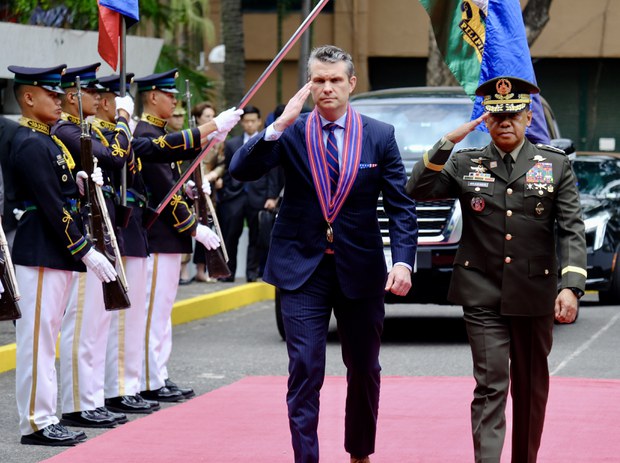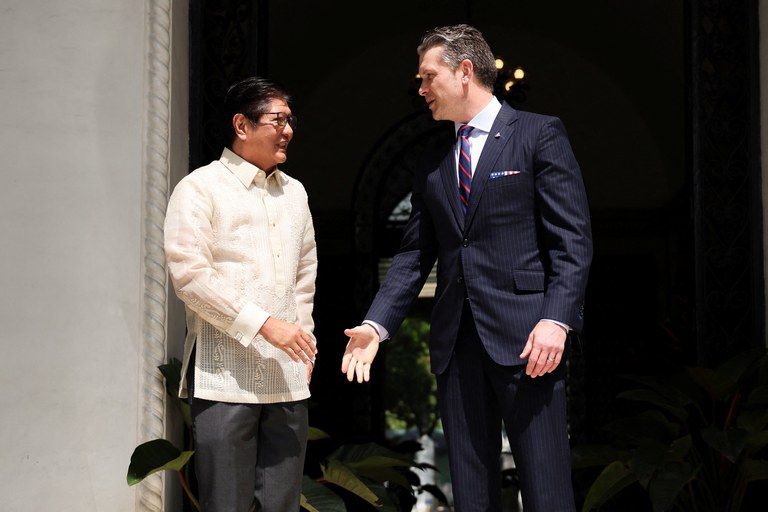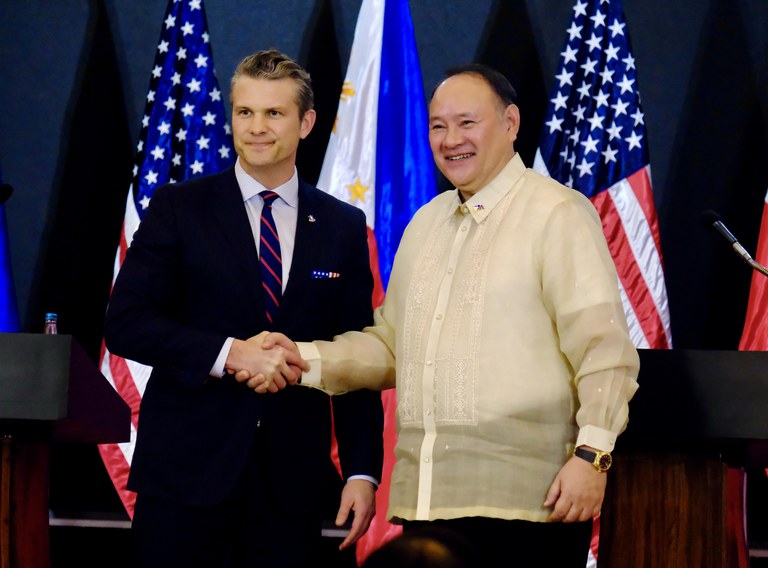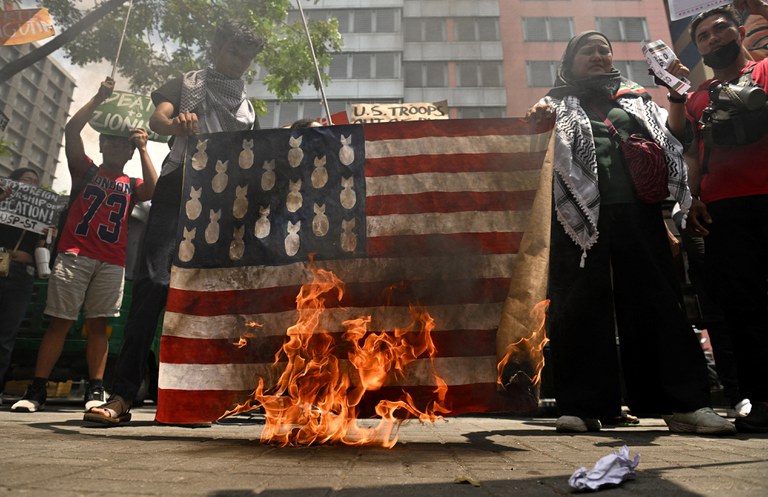US to send advanced military hardware to Philippines
2025.03.28
Manila
 U.S. Defense Secretary Pete Hegseth (center) salutes as he receives military honors at Camp Agunaldo, the Manila headquarters of the Philippine armed forces, as he walks beside Filipino military chief Gen. Romeo Brawner Jr., March 28, 2025.
U.S. Defense Secretary Pete Hegseth (center) salutes as he receives military honors at Camp Agunaldo, the Manila headquarters of the Philippine armed forces, as he walks beside Filipino military chief Gen. Romeo Brawner Jr., March 28, 2025.
The United States plans to deploy advanced military equipment to the Philippines to strengthen its deterrence against threats, officials from both countries said, as U.S. Defense Secretary Pete Hegseth made his first official visit to Manila.
Hegseth met with President Ferdinand Marcos Jr. and Philippine counterpart Gilberto Teodoro Jr. on Friday, reiterating that Washington’s defense commitment to its longtime ally in Southeast Asia would remain strong under the second Trump administration.
“Deterrence is necessary around the world, but specifically in this region, in your country, considering the threats from the communist Chinese, and that friends need to stand shoulder-to-shoulder to deter conflict,” the U.S. defense chief told Marcos, according to a transcript.
The Philippines is embroiled in tensions with China over contending territorial claims in the South China Sea. Standoffs have occurred lately in waters where Chinese coast guard ships often encroach into the Philippines’ exclusive economic zone.
“Your visit to the region, especially the fact that you have come to the Philippines as your first stop is a very strong indication (and) sends a very strong message of the commitment of both our countries to continue to work together to maintain the peace in the Indo-Pacific region within the South China Sea,” Marcos told Hegseth during their meeting at the presidential Malacañang Palace.

The United States would implement some new initiatives including “deploying more advanced U.S. capabilities in the Philippines” – among them, a mobile and land-based anti-ship missile launcher and unmanned surface vessels, according to a joint statement issued after Teodoro and Hegseth met.
Hegseth’s visit to Manila was the first by a top official from the new Trump administration.
RELATED STORIES
Pentagon chief Hegseth heads to Philippines amid South China Sea tensions
Hegseth commits US to defense of Pacific territories against China
Trump administration: Manila still has Washington’s ‘ironclad’ backing in South China Sea
U.S. President Donald Trump was “very committed” to the “ironclad” defense alliance between Manila and Washington, Hegseth said.
“What we’re dealing with right now is many years of deferred maintenance, of weakness that we have to reestablish strength and deterrence in multiple places around the globe. But pertinently today, for this region,” Hegseth said.
“We don’t seek intervention. President Trump has made it clear we don’t seek war …. We don’t seek to use chess pieces and move them around the board. All we seek is peace. All we seek is freedom and cooperation, and mutual benefit,” he added, according to a transcript from the Pentagon.
Hegseth arrived in Manila on Thursday night under a shadow cast by fallout from revelations that he and other senior U.S. national security officials had discussed plans to attack Houthi rebels in Yemen on the messaging app Signal with a journalist present.
Critics are calling it a flagrant violation of information security protocols and have called on Hegseth and National Security Adviser Mike Waltz to resign.

After the American and Filipino defense chiefs met, China’s foreign ministry warned that the Philippines should not start a conflict in the South China Sea with the support of the U.S.
“Any cooperation between the United States and the Philippines should not be directed against a third party or harm the interests of a third party, and it should not exaggerate the so-called threats, provoke confrontation and aggravate tensions in the region,” Chinese foreign ministry spokesman Guo Jiakun said at a press briefing.
“The U.S. side should abandon its Cold War mentality, stop instigating ideological confrontation, stop provoking trouble in the South China Sea and sowing discord in the region, and refrain from being an instigator in the South China Sea,” he said.
New bilateral security initiatives
Among the initiatives that Manila and Washington agreed to, the U.S. would deploy the land-based anti-ship missile launcher – the so-called Navy-Marine Expeditionary Ship Interdiction System (NMESIS) as part of the joint large-scale Balikatan (shoulder-to-shoulder) exercises happening next month in the Philippines.
American Special Operations Forces would also train together with Filipino marines in the Batanes chain, the Philippines’ northernmost islands that directly face Taiwan, the joint statement said.
“These efforts will accelerate the defense partnership and ensure that the alliance is postured to address the most consequential challenges in the Indo-Pacific region,” Hegseth and Teodoro said.
Analysts react
Geopolitical analyst Don McLain Gill underscored the importance of Hegseth’s trip amid the heightened tensions between Manila and Beijing in the South China Sea.
“The visit is significant because, as we can see, the bilateral security relations between the U.S. and the Philippines continue to deepen and broaden,” Gill, a lecturer at Manila’s De La Salle University, told BenarNews.
He said the trip “reaffirms the overarching trajectory, the positive trajectory of the Philippine-U.S. security relations.”
“The Philippines is one of the first countries the Pentagon chief is visiting,” Gill said. “So, it complements whatever is taking place on the ground, especially as Philippine and U.S. troops are gearing towards a more expanded defense activities.”
The trip is “a significant illustration of that commitment,” Gill said.

However, Hegseth’s visit signals a more robust U.S. military presence in the Philippines, which could invariably bring more instability to the Asia-Pacific, according to Liza Maza, a senatorial candidate and president of Makabayan, a nationalist party.
“While the Marcos regime hypes Hegseth’s visit this early in the Trump presidency as a supposed affirmation of solid U.S. commitment to defend the Philippines against China, the reality is that it merely fuels the heightening tension and instability in the region,” Maza, a former Congresswoman, said.
“Marcos allows the U.S. to use the Philippines as a dispensable pawn in its increasingly dangerous geopolitical chess game with rival China,” she said.







